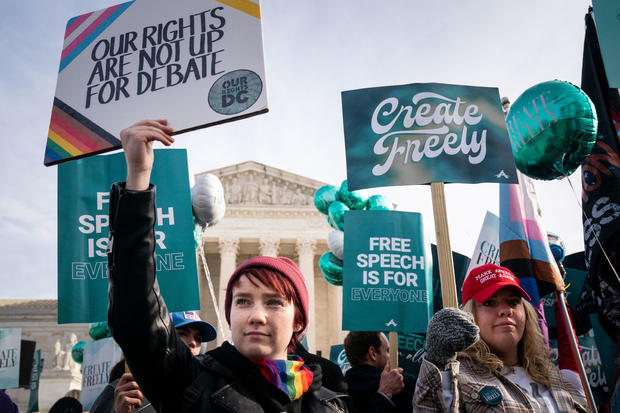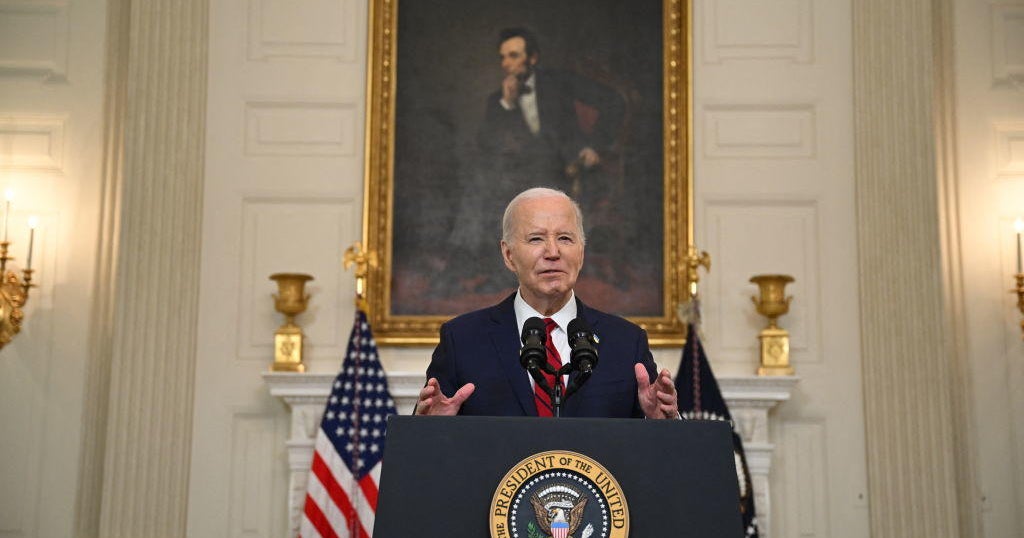Supreme Court sides with designer opposed to making same-sex wedding websites in case over LGBTQ rights and free speech
Washington — The Supreme Court on Friday ruled in favor of a Christian graphic artist from Colorado who does not want to design wedding websites for same-sex couples, finding the First Amendment prohibits the state from forcing the designer to express messages that are contrary to her closely held religious beliefs.
The court ruled 6-3 in favor of the designer, Lorie Smith, in the case known as 303 Creative LLC v. Elenis. All six conservative justices sided with the designer, while the court's three liberals dissented. Justice Neil Gorsuch delivered the majority opinion.
"The First Amendment envisions the United States as a rich and complex place where all persons are free to think and speak as they wish, not as the government demands," Gorsuch wrote.
"If [Smith] wishes to speak, she must either speak as the State demands or face sanctions for expressing her own beliefs, sanctions that may include compulsory participation in 'remedial ... training,' filing periodic compliance reports as officials deem necessary, and paying monetary fines," he said, referencing the penalties for violating Colorado's public accommodations law. "Under our precedents, that 'is enough,' more than enough, to represent an impermissible abridgment of the First Amendment's right to speak freely."
Justice Sonia Sotomayor read her dissenting opinion, joined by Justices Elena Kagan and Ketanji Brown Jackson, from the bench — a relatively rare act meant to underscore deep disagreement with the majority. It was the second time she has read a dissent aloud this term.
"Today, the Court, for the first time in its history, grants a business open to the public a constitutional right to refuse to serve members of a protected class," Sotomayor wrote.
The dissenting justices said the majority's decision gives businesses a "license to discriminate."
"[T]he decision itself inflicts a kind of stigmatic harm, on top of any harm caused by denials of service," Sotomayor wrote. "The opinion of the Court is, quite literally, a notice that reads: 'Some services may be denied to same-sex couples.'"
The decision from the justices is the latest in a string of successes for religious organizations and individuals who have sought relief from the high court and its conservative majority. It also resolves a lingering question, left unanswered since 2018, of whether states can compel artists to express messages that go against their beliefs in applying their public-accommodation laws.
The Supreme Court has now said states cannot, as forcing artists to create such speech would violate their free speech rights.
Kristen Waggoner, who argued on behalf of Smith, cheered the decision and reiterated that Smith's decisions to create speech hinge on the message being requested, not who is making the request.
"The court reiterated that it's unconstitutional for the state to eliminate from the public square ideas it dislikes, including the belief that marriage is the union of husband and wife," she said in a statement. "Disagreement isn't discrimination, and the government can't mislabel speech as discrimination to censor it."
President Biden, meanwhile, criticized the court's ruling and said he is concerned it could lead to discrimination against LGBTQ Americans.
"In America, no person should face discrimination simply because of who they are or who they love," the president said in a statement. "The Supreme Court's disappointing decision in 303 Creative LLC v. Elenis undermines that basic truth, and painfully it comes during Pride month when millions of Americans across the country join together to celebrate the contributions, resilience, and strength of the LGBTQI+ community."
Smith's religious objection to same-sex weddings
The case was brought by Smith, who said her Christian beliefs prevent her from creating custom websites for same-sex weddings. Smith started her web design business, 303 Creative, roughly a decade ago, and wants to expand to create websites for weddings. In addition to wanting to design websites to express God's "design for marriage as a long-long union between one man and one woman," Smith also wants to post a message explaining why she cannot make custom websites for same-sex weddings, which states that doing so compromises her Christian beliefs and tells "a story about marriage that contradicts God's true story of marriage."
But refusing to design custom websites for a same-sex wedding, and detailing why she plans to do so, could violate Colorado's public-accommodation law.
The state's law prohibits businesses open to the public from refusing service because of sexual orientation and announcing their intent to do so. Smith has not yet created any wedding websites or been asked to do so for a same-sex wedding, but argues Colorado's law violates her free speech rights since the state is forcing her to express a message she disagrees with.
Smith filed a lawsuit against the state, but lost in the lower courts. A federal appeals court said that while her wedding websites are "pure speech," the state had a compelling interest in ensuring access to her services.
Smith appealed to the Supreme Court, and the justices considered during oral arguments in December whether states like Colorado can, in applying their public accommodations laws, compel an artist to express a message they disagree with.
The latest Supreme Court dispute over LGBTQ rights
The dispute was one of several to land before the justices in the wake of its 2015 landmark decision establishing the right to same-sex marriage that raised the question of whether a business owner can refuse service to LGBTQ customers because of their religious beliefs.
In 2018, the high court sided with a Colorado baker who was sued after he refused to bake a cake for a same-sex wedding, but did not address whether a business can deny services to LGBTQ peple. Instead, the Supreme Court said the state's Civil Rights Commission was hostile to baker Jack Phillips' religious beliefs in violation of the First Amendment.
In the years after, the Supreme Court declined to clarify whether states could force religious business owners to create messages that violate their conscience. But the court's rightward shift, solidified by former President Donald Trump's appointment of three justices, raised concerns that the Supreme Court would erode LGBTQ rights by allowing businesses to deny services to LGBTQ customers.




